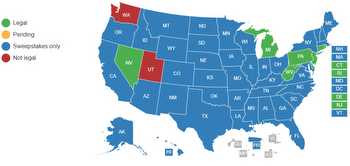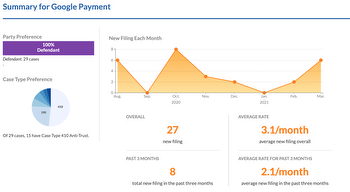The Flip-Flopping Online Gambling Ban in the US

Is online gambling illegal in the United States? At first, this may seem like a pretty straightforward question with an easy yes-or-no answer. The truth, however, is that the reality is slightly more convoluted.
Throughout its history, the US has had a fraught relationship with gambling and recently, online gambling has just further complicated the issue.
50 States with 50 Laws
Part of the reason for the complexity comes from the fact that there are no overarching federal laws in the United States that cover the gambit of gambling legality as a whole. For the most part, the federal government has left it up to individual states to decide how best to deal with gambling on a state-by-state basis.
There are 48 of the 50 states that allow legal gambling in some form. Every US state falls somewhere on a spectrum of an all-out gambling ban to gambling haven.
Only Utah and Hawaii have banned gambling completely whereas Nevada has long been known as a gambling-friendly state in which gambling is legal almost anywhere within the state. Most of the other states lie on the spectrum somewhere in between these two extremes in which gambling is allowed but only at licensed casinos.
States with Legal Online Gambling
The ongoing changes and updates to gambling law make it hard to keep track of what’s going on in the US but at the moment, there are a few states in which online gambling is currently permissible in an online casino format. These states include New Jersey, Pennsylvania, West Virginia, and Delaware.
This, however, brings us to our next point about what types of online gambling are allowed in different states within the US. Different types of betting and methods of gambling fall into different categories within US law and these distinctions can also determine legality by state.
Types of Gambling
When it comes to the legality of gambling in the US, the tricky part is trying to determine which forms of gambling fall under certain types of legislation. For example, New Jersey allows betting on horse races, sports betting, and casino games, whereas other states only allow sports betting.
Here, the type of game matters. In Washington state, casino games are forbidden anywhere except tribal land, sports betting prohibited statewide, but betting on horse racing is allowed without issue.
US Gambling Legislation
Gambling legislation in the US can be fairly called a can of worms. The laws passed are frequently overturned, reversed, or even ignored by some states. Let’s look at the two big ones that affect online gambling most acutely.
Unlawful Internet Gambling Enforcement Act of 2006
The Unlawful Internet Gambling Enforcement Act of 2006 was passed to make operating an online gambling website illegal in the United States. This act, however, has no bearing on players’ abilities to place wagers on an online gambling site.
Within the UIGEA is a provision that relates to wire transfers. This is a sticking point for many, preventing players (or entities) from knowingly accepting funds associated with online gambling. The important word here is “accept,” meaning that the law has no bearing on sending money whatsoever.
And speaking of wire transfers...
The Wire Act of 1961
The US’s official stance on online gambling states that gambling across state lines is illegal, according to the Wire Act of 1961 which prohibits online gambling that involves interstate transactions.
Its position from 2011 only prohibited sports betting under this set of laws but was later reversed by the Supreme Court. In 2018, the highest court in the land overturned the 2011 decision, leaving it entirely up to each state to determine their laws on sportsbooks and interstate betting. Talk about flip-flopping.
A Legal Grey Area
The ambiguity of online gambling legislation has allowed some operators to exist and function in a legal twilight zone. There are still offshore real money casinos operating in the grey areas. They utilize every trick in the book to allow US citizens to deposit and play for real money.
Despite the numerous prohibitions and confusion surrounding online gambling laws, in some ways, the vague language and lack of clarity allow for a significant amount of interpretation.
The Takeaway
The legal back-and-forth, flip-flopping, and frequent changes to US gambling law can really keep you on your toes. It seems that every year there are new additions, reversals, or state mandates that throw everything back into a state of confusion.
The takeaway here, however, is that currently, there are no longer any federal laws banning gambling, as long as it does not take place across state lines or involve an online betting platform based in the country. Beyond that, states are free to make their own laws around gambling, and many have enacted some form of restriction. Stay tuned for more to come!



































